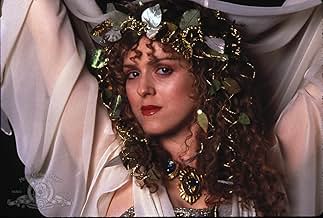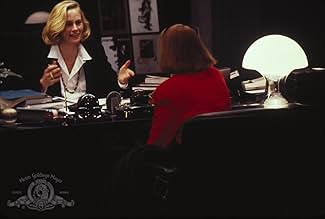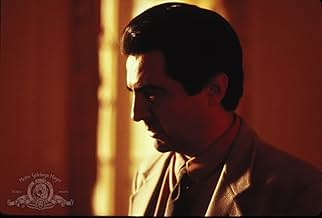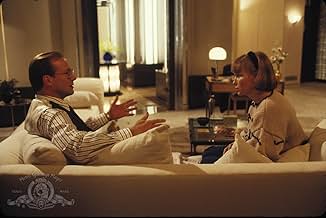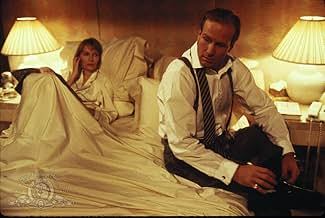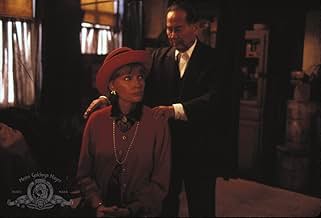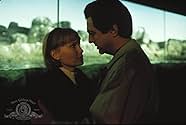IMDb-BEWERTUNG
6,6/10
15.864
IHRE BEWERTUNG
Eine verwöhnte Hausfrau aus Manhattan überdenkt ihr Leben, nachdem sie einen Heiler in Chinatown besucht hat.Eine verwöhnte Hausfrau aus Manhattan überdenkt ihr Leben, nachdem sie einen Heiler in Chinatown besucht hat.Eine verwöhnte Hausfrau aus Manhattan überdenkt ihr Leben, nachdem sie einen Heiler in Chinatown besucht hat.
- Für 1 Oscar nominiert
- 1 Gewinn & 7 Nominierungen insgesamt
Matthew H. Williamson
- Dennis
- (as Matt Williamson)
Empfohlene Bewertungen
Alice Tate (Mia Farrow) is living in New York City, married to Doug (William Hurt), a man from a wealthy family. They have two kids, a lavish condo and domestic employees. Alice eats caviar, spends her days shopping, getting manicures and pedicures, and so on. However, she's not very happy. She's even been thinking about having an affair. When she finally goes to see an acupuncturist, Dr. Yang (Keye Luke), on several friends' advice because her back is bothering her, he tells her that her problem is in her head, not her back. Through his extremely unorthodox treatments, Alice gradually transforms her life.
Although there is a fair amount of light humor in Alice, and it is relatively upbeat and hopeful, the bulk of this film is much more in the vein of director/writer Woody Allen's more "serious" straightforward dramas, ala Interiors (1978), September (1987) and Another Woman (1988). Interestingly, Allen has a strong fantastical thread running through Alice at the same time, and it references a number of literary classics--both thematically and occasionally in terms of more literal content-resulting in a kinship also with Allen's A Midsummer Night's Sex Comedy (1982).
At its heart, Alice is a film about awakening and then achieving authenticity. It is told with a nod to Charles Dickens' A Christmas Carol (1843) (which is even supported by the appearance of "O Tannenbaum/We Wish You A Merry Christmas" by Liberace on the soundtrack at one point), with slight references also to Lewis Carroll's Alice's Adventures in Wonderland (1865) and other fantasy literature, including J.M. Barrie's Peter Pan (1911).
The catalyst through all of Alice's revelations is Dr. Yang, whose slightly rundown Chinatown office is symbolic of Alice periodically making trips to another world for enlightenment, or making repeated treks to pose questions to a metaphorical Oracle at Delphi. Dr. Yang's treatments are designed to address the various ways in which Alice needs to "open up", the various emotional needs she must come to terms with.
It is interesting to note, especially after Allen's The Curse of the Jade Scorpion (2001), that the initial spark for Alice's transformation is provided by hypnotism, as that device appears for the same ultimate purpose in Curse. This probably has some significance for Allen outside of his life in film, although it is difficult to say whether its because he's undergone hypnotic treatment himself or whether he just sees it as a metaphor for digging beneath public facades which one has fooled oneself into believing, too.
Dr. Yang's treatments either result in encountering some important person or event from Alice's past and/or tapping into some unrealized potential. The encounters are often not with real persons. They can be memories made almost literal, ghosts, or hallucinations. These are the most direct parallel to A Christmas Carol. As in that story, eventually Dr. Yang's treatments lead Alice away from an embrace of materialism for its own sake to an appreciation of more humanist values. Of course, Allen makes it a bit more complex than this, so that the positive transformation also has an impact on personal relationships that could be seen as negative, as well.
Alice is also remarkable for its cinematography, which is usually symbolic of the dramatic scenarios. Sometimes this is very overt, as when Dr. Yang's office transforms into an amusement park midway (the slowly strobing red light was particularly exquisite, with red also symbolizing caution), and often it is subtler, as with the tracking shots of Alice and Vicki (Judy Davis) seen through various glass-like surfaces, or Alice and Joe (Joe Mantegna) through a fence as prison bars, or Alice and Dr. Yang with a wall in between them as the camera pans from one to the other, and so on.
Of course the performances are good--Allen can even get admirable performances out of actors whom I usually do not care for, such as William Hurt. Of course most of the dialogue can easily be imagined as emerging from Allen's mouth instead of whatever character happens to be on screen. And of course the music selection is a fine collection of mostly pre-bop classic jazz. In other words, this is a typical post-Annie Hall (1977) Allen film, so if you like his style, Alice is a safe bet, and if you already know you dislike his style, you're probably not even reading this far.
Although there is a fair amount of light humor in Alice, and it is relatively upbeat and hopeful, the bulk of this film is much more in the vein of director/writer Woody Allen's more "serious" straightforward dramas, ala Interiors (1978), September (1987) and Another Woman (1988). Interestingly, Allen has a strong fantastical thread running through Alice at the same time, and it references a number of literary classics--both thematically and occasionally in terms of more literal content-resulting in a kinship also with Allen's A Midsummer Night's Sex Comedy (1982).
At its heart, Alice is a film about awakening and then achieving authenticity. It is told with a nod to Charles Dickens' A Christmas Carol (1843) (which is even supported by the appearance of "O Tannenbaum/We Wish You A Merry Christmas" by Liberace on the soundtrack at one point), with slight references also to Lewis Carroll's Alice's Adventures in Wonderland (1865) and other fantasy literature, including J.M. Barrie's Peter Pan (1911).
The catalyst through all of Alice's revelations is Dr. Yang, whose slightly rundown Chinatown office is symbolic of Alice periodically making trips to another world for enlightenment, or making repeated treks to pose questions to a metaphorical Oracle at Delphi. Dr. Yang's treatments are designed to address the various ways in which Alice needs to "open up", the various emotional needs she must come to terms with.
It is interesting to note, especially after Allen's The Curse of the Jade Scorpion (2001), that the initial spark for Alice's transformation is provided by hypnotism, as that device appears for the same ultimate purpose in Curse. This probably has some significance for Allen outside of his life in film, although it is difficult to say whether its because he's undergone hypnotic treatment himself or whether he just sees it as a metaphor for digging beneath public facades which one has fooled oneself into believing, too.
Dr. Yang's treatments either result in encountering some important person or event from Alice's past and/or tapping into some unrealized potential. The encounters are often not with real persons. They can be memories made almost literal, ghosts, or hallucinations. These are the most direct parallel to A Christmas Carol. As in that story, eventually Dr. Yang's treatments lead Alice away from an embrace of materialism for its own sake to an appreciation of more humanist values. Of course, Allen makes it a bit more complex than this, so that the positive transformation also has an impact on personal relationships that could be seen as negative, as well.
Alice is also remarkable for its cinematography, which is usually symbolic of the dramatic scenarios. Sometimes this is very overt, as when Dr. Yang's office transforms into an amusement park midway (the slowly strobing red light was particularly exquisite, with red also symbolizing caution), and often it is subtler, as with the tracking shots of Alice and Vicki (Judy Davis) seen through various glass-like surfaces, or Alice and Joe (Joe Mantegna) through a fence as prison bars, or Alice and Dr. Yang with a wall in between them as the camera pans from one to the other, and so on.
Of course the performances are good--Allen can even get admirable performances out of actors whom I usually do not care for, such as William Hurt. Of course most of the dialogue can easily be imagined as emerging from Allen's mouth instead of whatever character happens to be on screen. And of course the music selection is a fine collection of mostly pre-bop classic jazz. In other words, this is a typical post-Annie Hall (1977) Allen film, so if you like his style, Alice is a safe bet, and if you already know you dislike his style, you're probably not even reading this far.
Or "Alice Doesn't Live Here Anymore" (Scorsese fans will get the reference), there seems to be some inner-girl escape-impulse associated to the name Alice and Woody Allen's heroine, played by the irresistible Mia Farrow, is no exception.
Alice is married to Doug, a wealthy businessman played by William Hurt. Together, they live in a luxurious apartment of Manhattan, her kids go to a private Catholic school, she's got a baby sitter, a cook, a trainer, a decorator, and all the time in the world to go shopping, get beauty treatments, gossip with her friends... and worry.
Some deep torment expresses itself through backaches and a sort of Catholic guilt due to her infatuation on Joe Ruffalo, a dark and handsome Jazz musician played by Joe Mantegna. Something is burning inside, channeling itself through that innocent lust, behind the obvious, there might be some strong existential call. Following numerous advice, Alice visits Dr. Yang (Keye Luke) a herbalist who seems to know what it's all about, certainly not the back.
The film deals with serious matters such as existential boredom, meaning of life, infidelity, but the "Chinese Riff" and tango leitmotifs remind us that this is all played for laughs, so we're not surprised when the treatment ventures in the realm of fantasy. Comedy needs that extra-kick when the laughs are too mild-mannered. For instance, when Alice mentions that penguin mate for life, Yang's answers "you think they're Catholic?" echo the infamous 'pigeon' quote from "Hannah and her Sisters" and it's not a good sign when Allen recycles his own jokes.
Only halfway through the film when the adoration of Mother Teresa and a few references about childhood reemerged that I understood that Catholicism wouldn't be the butt-monkey of Allen's humor but something with a strong bearing on Alice's guilt and existential crisis. Something that can be summed up in that quote from "Inherit the Wind": "What touches you, what warms you? Every man has a dream. What do you dream about? What... what do you need?"
The answer is surely not in Alice's life, Doug constantly belittles her ambitions, a TV series executives played by Cybil Shepherd dismisses her writing projects, and everyone treats her with relative condescendence. It's hard to believe that the film was released 22 years after "Rosemary's Baby". Here is Mia Farrow as a middle-aged mother caught in the suffocating coziness of an apartment supported by seemingly benevolent people and looking as frail, powerless and "young" as her Rosemary counterpart.
I guess fragility has always been Mia's strongest suit, one she wears with grace and gentleness, the only negative feeling she's capable to embody is that Catholic guilt less as a principle than an alibi to her incapability to fight, except her own demons. That's Alice Tate in a nutshell, and one can draw parallels with Cecilia from "The Purple Rose of Cairo", a woman who could only find artifices to escape her condition (and coincidentally, the film became my highly rater movie for helpfulness).
So there's one thing that Woody Allen's "Alice" gets right is the casting, Diane Keaton is too strong and free-spirited to fit the character. It's obvious Allen wrote it for and with Mia in mind, a few years before their marriage would collapse, foreshadowing of many scandals and accusations. I'd rather ignore the storm and contemplate the silence; this is one of Mia Farrow's best roles and it was written by someone who obviously knew her a lot and loved her enough to provide her a character with a happy ending, not bittersweet but happy. Mia was overdue one.
There's a catch though, she's so sweet and genuinely sympathetic that she' not really the best choice for a leading comedic role, it's not a case of "women can't be funny" but there's a moment where after drinking of a mixture, she learns how to talk with a seductive voice and talks sexy with Joe , who responds nervously. That scene was funny but it was incongruous and I was afraid it would be a "reveal your inner self" moment. I needed to relate to the real Alice, which happens to be in line with Mia's personality.
So the film is a series of situation where a fantasy device allows Alice to know about her husband's whereabouts, to talk with her deceased ex-boyfriend, a sexy bad boy played by Alec Baldwin, to have a hilarious talk with her muse played by Bernadette Peters, to talk with her mother... it's basically a psychoanalysis through magical plants with many visual gags, some genuinely good moments, especially the visit to her sister played by Blythe Danner, but we're never taken to the heights reached by "Hannah and Her Sisters" or "The Purple Rose of Cairo" except for a hilarious sequence involving a love potion.
Despite a few moments of creativity, the film is Woody Allen at his mildest, driving us at cruise speed to a satisfying ending where Alice finally fulfills her dreams because she knew how to control herself and get rid from her entourage's nuisance, embodying that quote from a French great man named Clemenceau: "in life, you've got to know what you want to do, have the courage to say it and the energy to do it."
Still, had they made a "Real Housewives of Manhattan" in 1990, I wonder if a character like Alice Tate would have been kept in regard to audiences' premises. She'd be just too gentle, too shy, too introverted to contribute to the narrative dynamics... and yet she is the titular heroine of a film with a high promise, the result is uneven, it's heart-warming but slow-paced though not deprived of interesting dynamics.
Maybe there's a reason why it's rarely mentioned among Allen's best... but never among his worst. Some would call it a gem, I would call it an enjoyable little film. Which is good enough.
Alice is married to Doug, a wealthy businessman played by William Hurt. Together, they live in a luxurious apartment of Manhattan, her kids go to a private Catholic school, she's got a baby sitter, a cook, a trainer, a decorator, and all the time in the world to go shopping, get beauty treatments, gossip with her friends... and worry.
Some deep torment expresses itself through backaches and a sort of Catholic guilt due to her infatuation on Joe Ruffalo, a dark and handsome Jazz musician played by Joe Mantegna. Something is burning inside, channeling itself through that innocent lust, behind the obvious, there might be some strong existential call. Following numerous advice, Alice visits Dr. Yang (Keye Luke) a herbalist who seems to know what it's all about, certainly not the back.
The film deals with serious matters such as existential boredom, meaning of life, infidelity, but the "Chinese Riff" and tango leitmotifs remind us that this is all played for laughs, so we're not surprised when the treatment ventures in the realm of fantasy. Comedy needs that extra-kick when the laughs are too mild-mannered. For instance, when Alice mentions that penguin mate for life, Yang's answers "you think they're Catholic?" echo the infamous 'pigeon' quote from "Hannah and her Sisters" and it's not a good sign when Allen recycles his own jokes.
Only halfway through the film when the adoration of Mother Teresa and a few references about childhood reemerged that I understood that Catholicism wouldn't be the butt-monkey of Allen's humor but something with a strong bearing on Alice's guilt and existential crisis. Something that can be summed up in that quote from "Inherit the Wind": "What touches you, what warms you? Every man has a dream. What do you dream about? What... what do you need?"
The answer is surely not in Alice's life, Doug constantly belittles her ambitions, a TV series executives played by Cybil Shepherd dismisses her writing projects, and everyone treats her with relative condescendence. It's hard to believe that the film was released 22 years after "Rosemary's Baby". Here is Mia Farrow as a middle-aged mother caught in the suffocating coziness of an apartment supported by seemingly benevolent people and looking as frail, powerless and "young" as her Rosemary counterpart.
I guess fragility has always been Mia's strongest suit, one she wears with grace and gentleness, the only negative feeling she's capable to embody is that Catholic guilt less as a principle than an alibi to her incapability to fight, except her own demons. That's Alice Tate in a nutshell, and one can draw parallels with Cecilia from "The Purple Rose of Cairo", a woman who could only find artifices to escape her condition (and coincidentally, the film became my highly rater movie for helpfulness).
So there's one thing that Woody Allen's "Alice" gets right is the casting, Diane Keaton is too strong and free-spirited to fit the character. It's obvious Allen wrote it for and with Mia in mind, a few years before their marriage would collapse, foreshadowing of many scandals and accusations. I'd rather ignore the storm and contemplate the silence; this is one of Mia Farrow's best roles and it was written by someone who obviously knew her a lot and loved her enough to provide her a character with a happy ending, not bittersweet but happy. Mia was overdue one.
There's a catch though, she's so sweet and genuinely sympathetic that she' not really the best choice for a leading comedic role, it's not a case of "women can't be funny" but there's a moment where after drinking of a mixture, she learns how to talk with a seductive voice and talks sexy with Joe , who responds nervously. That scene was funny but it was incongruous and I was afraid it would be a "reveal your inner self" moment. I needed to relate to the real Alice, which happens to be in line with Mia's personality.
So the film is a series of situation where a fantasy device allows Alice to know about her husband's whereabouts, to talk with her deceased ex-boyfriend, a sexy bad boy played by Alec Baldwin, to have a hilarious talk with her muse played by Bernadette Peters, to talk with her mother... it's basically a psychoanalysis through magical plants with many visual gags, some genuinely good moments, especially the visit to her sister played by Blythe Danner, but we're never taken to the heights reached by "Hannah and Her Sisters" or "The Purple Rose of Cairo" except for a hilarious sequence involving a love potion.
Despite a few moments of creativity, the film is Woody Allen at his mildest, driving us at cruise speed to a satisfying ending where Alice finally fulfills her dreams because she knew how to control herself and get rid from her entourage's nuisance, embodying that quote from a French great man named Clemenceau: "in life, you've got to know what you want to do, have the courage to say it and the energy to do it."
Still, had they made a "Real Housewives of Manhattan" in 1990, I wonder if a character like Alice Tate would have been kept in regard to audiences' premises. She'd be just too gentle, too shy, too introverted to contribute to the narrative dynamics... and yet she is the titular heroine of a film with a high promise, the result is uneven, it's heart-warming but slow-paced though not deprived of interesting dynamics.
Maybe there's a reason why it's rarely mentioned among Allen's best... but never among his worst. Some would call it a gem, I would call it an enjoyable little film. Which is good enough.
When I first saw Alice, I didn't know it was a Woody Allen movie, but I can imagine if I'd been expecting the usual stammering joke fest, I might have wondered where Woody's influence went. He doesn't always make strict comedies, though, and this movie proves it.
Mia Farrow and William Hurt are married, have two children, and live the high-life. But Mia, in the title role, is unsatisfied and she doesn't know why. She visits a Chinese acupuncturist to help with some back pain and enters a journey of self-discovery.
Mia does a wonderful job in this slightly off-beat flick. Just as in The Purple Rose of Cairo when she rises above an unhappy marriage and finds herself, she expresses curiosity, sadness, hope, and invigoration all at the right times. I happen to be a Mia Farrow fan, so I was expecting to like this movie, but my mom doesn't like her nearly as much as I do, and she still really enjoyed Alice. As always in Woody Allen movies, there's a large cast, and this one includes Alec Baldwin, Blythe Danner, Cybill Shepherd, Joe Montegna, June Squibb, Julie Kavner, Bernadette Peters, Gwen Verdon, and Bob Balaban. Alice is thoughtful and sweet, and a great movie to watch when you're pondering the universe.
Mia Farrow and William Hurt are married, have two children, and live the high-life. But Mia, in the title role, is unsatisfied and she doesn't know why. She visits a Chinese acupuncturist to help with some back pain and enters a journey of self-discovery.
Mia does a wonderful job in this slightly off-beat flick. Just as in The Purple Rose of Cairo when she rises above an unhappy marriage and finds herself, she expresses curiosity, sadness, hope, and invigoration all at the right times. I happen to be a Mia Farrow fan, so I was expecting to like this movie, but my mom doesn't like her nearly as much as I do, and she still really enjoyed Alice. As always in Woody Allen movies, there's a large cast, and this one includes Alec Baldwin, Blythe Danner, Cybill Shepherd, Joe Montegna, June Squibb, Julie Kavner, Bernadette Peters, Gwen Verdon, and Bob Balaban. Alice is thoughtful and sweet, and a great movie to watch when you're pondering the universe.
Less known that Allen's "Annie Hall", "Hannah and her Sisters", "Crimes and Misdemeanors", and "Manhattan", "Alice" is a charming and delightful film that can be viewed as Allen's remake of "Juliet of Spirits" with some obvious themes from "Alice in Wonderland". Mia Farrow plays a wealthy New Yorker who one day feels that something is missing in her sheltered and comfortable life. She turns to a Chinese doctor whose magic herbs help her to reevaluate her life and her relationships with her husband, lover, mother, and sister. She may not find the answers for all the questions but she certainly learned a lot about herself. During the few days that film takes place, Alice experiences romance, finds spirituality, and even enjoys the power of invisibility. This film has one of the most optimistic endings in Woody's film. Mia Farrow is absolutely wonderful.
Mia Farrow excels in this unexpectedly charming fable. I think if people happened upon this movie not knowing it was a Woody Allen film, they would be more than pleased with it. Knowing it is Woody, maybe many fans hold it to a higher standard. True, it's not anywhere near being his funniest or greatest film. But I think it is a well-cast, well-shot, well-produced, and even well-written tale. Knowing it's history, I was not expecting to like it nearly as much as I did. But I did, and I look forward to seeing it again. Mia really is underrated as an actress, isn't she?
Wusstest du schon
- WissenswertesSean Young filmed a small role, but it was later cut. She had been deleted from Woody Allen's previous film Verbrechen und andere Kleinigkeiten (1989) as well.
- PatzerWhen Thelonious Monk's version of "Darn That Dream" appears on the soundtrack, the LP sleeve of "Monk's Dream" is shown, implying that Alice and Joe are listening to it. However, the tune is not featured on that album.
However, implications are not necessarily fact; it might be that Alice and Joe had been listening to several Monk albums and had not been meticulous in returning the discs to the appropriate sleeves.
- SoundtracksLimehouse Blues
Written by Philip Braham & Douglas Furber
Performed by Jackie Gleason
Courtesy of Capitol Records, Inc.
By arrangement with CEMA Special Markets
Top-Auswahl
Melde dich zum Bewerten an und greife auf die Watchlist für personalisierte Empfehlungen zu.
Details
Box Office
- Budget
- 12.000.000 $ (geschätzt)
- Bruttoertrag in den USA und Kanada
- 7.331.647 $
- Eröffnungswochenende in den USA und in Kanada
- 36.274 $
- 25. Dez. 1990
- Weltweiter Bruttoertrag
- 7.331.647 $
- Laufzeit1 Stunde 46 Minuten
- Farbe
- Seitenverhältnis
- 1.85 : 1
Zu dieser Seite beitragen
Bearbeitung vorschlagen oder fehlenden Inhalt hinzufügen



